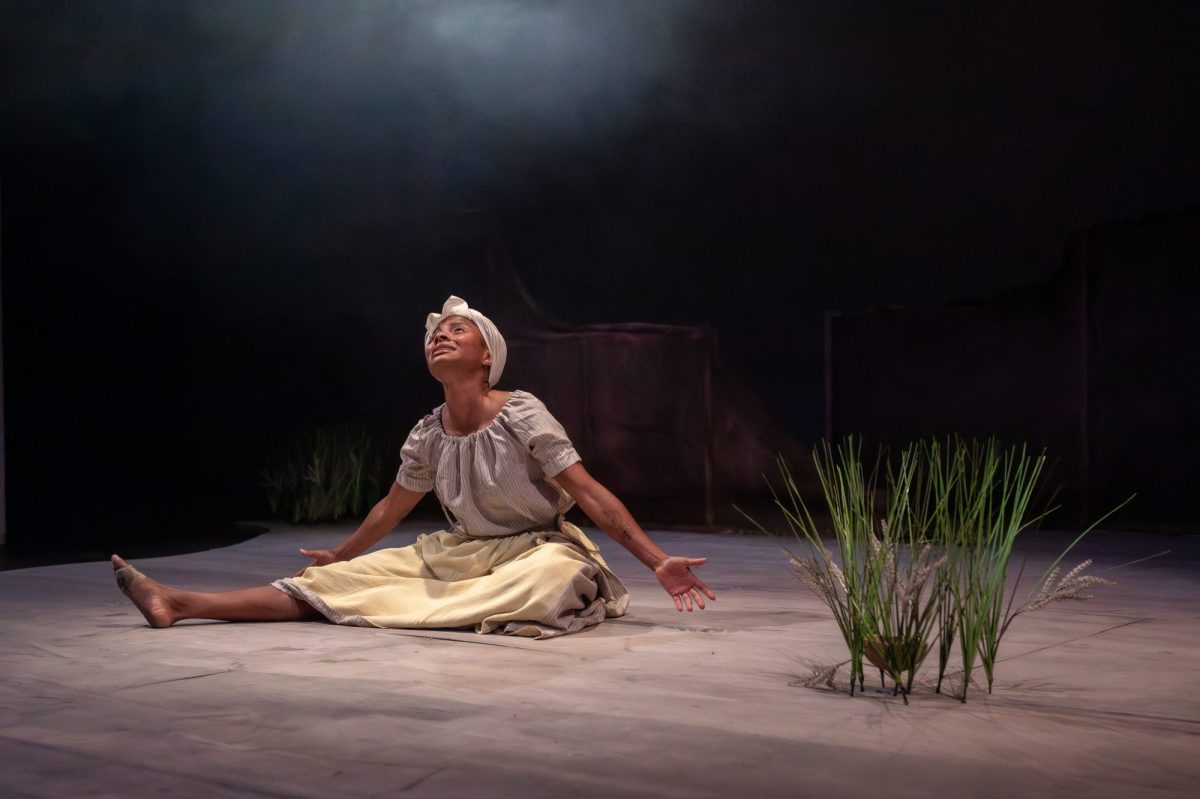In ILARUN: The Cutting Comb, Amarantha Robinson, a Jamaican Australian woman with West African heritage and Effie Nkrumah, a Ghanaian Australian woman, weave a painfully entertaining body of work that darts between period and contemporary pieces. They employ music, props, language and audience engagement.
Nkrumah of Who No Kno Go Kno continues to establish herself as a powerful presence in Australian theatre. She skilfully navigates the potential complexity of the narrative, crafting it into a cohesive and engaging experience.
Against an 18th century colonial Jamaica backdrop, the multi-talented Robinson centres the tale on a matriarch powerhouse – the larger than life Nanny of the Maroons (c 1686–c 1760) played by Amarantha Robinson. Nanny, a legendary figure in Jamaican history, was a leader of the Maroons. They were escaped enslaved Africans who established independent communities in the island’s mountains. Born in West Africa, she was brought to Jamaica during the transatlantic slave trade. After escaping from slavery, Nanny became a pivotal figure in the First Maroon War, leading her people in guerrilla warfare against British colonial forces.
ILARUN: The Cutting Comb is a powerful Afrofuturism piece that intricately weaves together elements of African mythology, history and a visionary future to explore and redefine the Black experience. Through its narrative, the play amplifies marginalised voices and envisions alternative realities, seamlessly integrating spirituality, ancestral wisdom and technology.
At the heart of this narrative is the Ilarun comb, a vital symbol for the protagonist, Juicy, played by Robinson. Following her discovery of the comb, she is connected by it to Oya, the Yoruba Orisha of winds, storms and transformation, enabling Juicy to reclaim her identity, sexuality and feminine power, which have long been suppressed by colonial oppression.
This connection catalyses a profound transformation within Juicy, allowing her to remember her true self and assert her agency against the colonial master who sexually exploits her body and uses it as a commodity.
The hair comb, a culturally significant artefact, is renowned for its exquisite craftsmanship and is exemplified as a hero prop in the play by the artistry of the award-winning Sandra Ghithinji Studios, which has also crafted the grand yet minimalist masks worn during Juicy’s spiritual encounter. The Ilarun comb serves as a pivotal tool in reconnecting Juicy with her sister, Hetty (played by Zimbudzi).
Once pitted against each other by their oppressor – who exploited Juicy for her beauty while relegating Hetty to gruelling labour on a sugarcane plantation – the sisters begin to reconcile through the comb. By embracing their shared struggle and recognising the strength of their bond, they dismantle the divisions imposed by colonialism. This act of reconciliation empowers them individually and collectively, especially as they unite with Jabari (Alpha Kargbo), who previously exhibited blind loyalty to his master. Together, they strengthen their resistance against the colonial power that seeks to divide them.
In the play, the Ilarun serves not only as a mystical weapon, but also, of course, as a tool for grooming – an essential aspect of personal and cultural identity. The object is employed as a transformative exploration of identity and belonging, illustrating how the reclamation of cultural artefacts can inspire empowerment and foster community amid the remnants of colonial legacy.
The ensemble are dedicated to their fully developed characters, regardless of the physical and emotional demands of the story.
The minimalist set design serves as an effective backdrop for the high-energy performance, while the inventive lighting and soundscape – especially the live drumming and choreography by Kwame Tosuma –immerse the audience fully in the experience. The costumes are impeccably crafted, allowing the performers to navigate the story and space with effortless grace.
Read: Exhibition review: Carol Jerrems: Portraits, National Portrait Gallery, Canberra
ILARUN: The Cutting Comb is a tale of resilience that sweeps the audience through a whirlwind of emotions, from rage to laughter.
ILARUN: The Cutting Comb
fortyfivedownstairs
Writer and Producer: Amarantha Robinson
Director: Effie Nkrumah
Dramaturg: Morgan Rose
Consulting Producer: Linda Catalano
Production Manager: Flick
Stage Manager: Jade Hibbert
Set and Costume Designer: Harry Gill
Associate Set and Costume Designer: Rachel Nankin
Headpiece Designer: Sandra Githinji
Lighting Designer: John Collopy
Sound Designer: Jack Burmeister
Choreographer: Kwame Tosuma
Fight Scene Coordinator: Joshua Bell
Intimacy Coordinator: Lucy Payne
Photographer: Andreyna Sanchez
Live drumming: Benjamin Borketey
Choreography: Kwame Tosuma
Cast: Amarantha Robinson, Alpha Kargbo, David John Watton, William Hall, Rufaro Zimbudzi
Tickets: $35-$49
ILARUN: The Cutting Comb will be performed until 15 December 2024.





